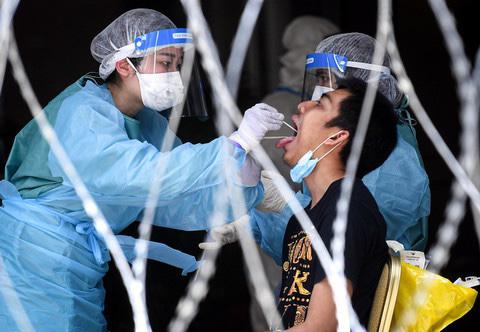KUALA LUMPUR, May 8 — The Ministry of Health (MOH) has clarified that private clinics cannot use rapid tests for Covid-19 screening currently, only PCR tests that require collaboration with laboratories.
MOH’s Private Medical Practice Control Section (CKAPS) under the ministry’s Medical Practice Division said in an FAQ dated May 6 that presently, MOH’s Guidelines Covid-19 Management No. 5/2020 (updated 24 March 2020) only recognises the gold-standard rt-PCR tests that must send samples to labs, though nose and throat swabs can be taken at clinics.
In response to a question about Health director-general Dr Noor Hisham Abdullah’s April 21 letter to the Social Security Organisation (Socso) permitting the use of antibody rapid test kits (RTK) at private clinics, MOH’s CKAPS said the DG’s letter was addressed to the social security fund, not to medical practitioners.
“Therefore, to ensure that there are no legal and health implications for medical practitioners and patients, only rt-PCR is allowed as a Covid-19 screening method at this time,” MOH’s CKAPS said in its FAQ.
PCR tests detect active coronavirus infection and hence, are used to diagnose Covid-19, but lab results take 24 to 48 hours. Rapid antibody tests, on the other hand, require a simple pin-prick procedure to draw a drop of blood, but they can only detect a previous infection and, as such, require two negative tests within a week before a worker can go to work, as per Dr Noor Hisham’s letter to Socso.
MOH’s latest instruction comes despite the International Trade and Industry Ministry (MITI) previously saying last month that workers should be tested at Socso panel clinics for Covid-19 before returning to work.
Socso said the first phase of its Prihatin Screening Programme (PSP) uses PCR tests — provided by laboratory company BP Healthcare — for foreign workers and local employees working in Covid-19 red or yellow zones. The government has made it compulsory for all migrant workers, numbering at over two million nationwide, to be tested for coronavirus, starting with construction labourers in Kuala Lumpur and Selangor.
Only subsequent phases of the PSP will utilise rapid antibody tests at private general practitioner (GP) clinics, Socso said Wednesday, but these will only be available in the country in 14 to 21 days at the earliest.
Socso will pay for the screening of its contributors (60 per cent of foreign workers contribute to Socso), while for non-contributors, Senior Defence Minister Ismail Sabri Yaakob suggested co-payments by both employer and employee. PCR swab tests are much more expensive than rapid antibody tests, with Socso reportedly planning to pay GP clinics RM60 to screen workers with the latter. PCR tests can cost up to 10 times more.
On a question about whether private clinics need to undergo MOH training if they want to do rapid tests for Covid-19, CKAPS said MOH’s Family Health Development Division (BPKK) was currently organising training on how to take and manage samples for PCR tests.
“However, rapid test kits have yet to be listed in the Guidelines Covid-19 Management No. 5/2020 (updated 24 March 2020),” said CKAPS’ FAQ.
CKAPS also said private hospitals were prohibited from doing Covid-19 screenings outside their premises, such as in offices or factories, due to the Health Minister’s second 2019 circular, according to the Private Healthcare Facilities and Services Act 1998 that only permits clinics to do outreach programmes outside their premises.
“At the same time, Socso has also set policies related to its Covid-19 screening programme for workers, including foreign workers, for companies allowed to operate during the Movement Control Order (MCO) through the Prihatin Screening Programme that is only limited to private GP clinics.”
Clinics that want to provide Covid-19 screening and triaging services were referred to MOH’s Medical Practice Division’s March 27 2020 letter, which, among others, requires staff trained to take and manage samples, use MOH-approved test kits, and collaboration with private laboratories that run PCR tests to detect coronavirus.
Questions about the operation of medical aesthetic clinics were also answered in CKAPS’ statement as aesthetics services are listed under the list of prohibited activities according to standard operating procedures (SOP) published by the National Security Council (NSC).
“The term aesthetic clinic does not exist because all medical clinics offering aesthetic services are still described as general medical clinics with areas of interest (aesthetics),” the FAQ states in response as to whether medical clinics with aesthetic services can operate at this time.
“Therefore, the clinic can operate as a private medical clinic without providing aesthetic services.”








